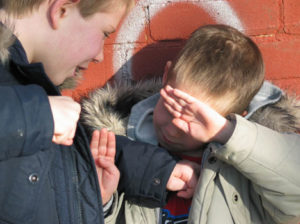Dartmouth’s recent meta-analysis published in Proceedings of the National Academy of Sciences (PNAS) has seemed to indicate a correlation between playing video games that feature violent content and a surge in physically aggressive behavior in adolescent gamers.
This has been a rather contentious issue, with vocal proponents on both side of the divide citing the validity of this theory or lack thereof. Dartmouth sought to get some concrete answers and conducted a 7-year long meta-analysis, ranging from 2010 to 2017 and spanning 24 studies worldwide. It included over 17,000 research participants ranging in age from nine to 19 years of age and followed them, searching specifically for incidences of physical aggression such as fighting or hitting another person over the course of periods ranging from three months to four years.

Playing the wrong kinds of video games can result in violence seeping out into real life.
The results, which were compiled based on reports from teachers and parents, did indicate a correlation between playing violent video games and incidences of physical aggression. The report also indicated that these incidences were higher among certain ethnic groups than others…chiefly, white participants with minor effects on Asian participants and no marked rise in aggression among Hispanic participants. Researchers attributed this to differing outlooks regarding empathy. Eastern and Hispanic cultures tend to value empathy and continuing to empathize with victims of aggression, while Western and European cultures tend toward so-called “rugged individualism,” which does not extol empathy as a virtue, but as a form of weakness.
Sadly, this kind of thinking has very physical manifestations as evidenced by this study which builds on ongoing research into the effects of video games on behavior, chiefly how they influence reckless behavior in youths.
If you’re concerned about a lack of empathy in your child, you should definitely take some steps to correct this and encourage more empathetic behavior starting with leading by example. In conversations with your child, always ask how you think their decisions made another person feel, or ask them periodically to put themselves in another person’s shoes. Also be sure to always show empathy when you find yourself in social settings of any kind. Try to monitor the media they watch and raise awareness of the importance of empathy and of emulating role models who exhibit empathy instead of toxic behavioral patterns like narcissism and aggression.
You have the power to make a lasting impact in the life of your child, who will one day shape the world by their actions. Make wiser choices now, so they can too.


